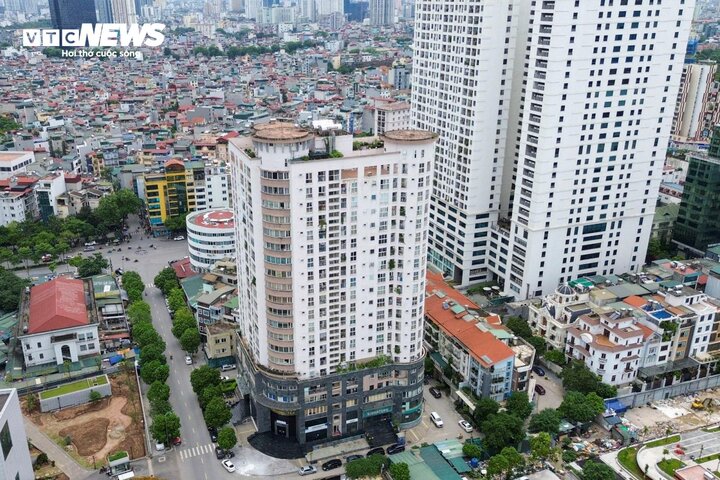The recent ban on using apartments for short-term rental services, such as Airbnb, has sparked debates among citizens and experts alike. Many individuals, like Ms. Nguyen Dieu Nhi from Hoan Kiem, Hanoi, have invested significant amounts of money in purchasing apartments for this very purpose. With a near 10-billion-dong investment, Ms. Nhi’s apartments have been generating profitable returns, maintaining an occupancy rate of over 85%. However, the new regulations have disrupted her business significantly.
Those who invested their own money, like Ms. Nhi, are concerned, but those who leveraged financial tools are even more worried. Mr. Hong Son, from Hai Ba Trung, Hanoi, shares that he borrowed nearly 4 billion dong to invest in this business model. Without a satisfactory solution, he faces the risk of losing a substantial amount of money.
“I’m sitting on a powder keg,” Mr. Son anxiously explains, “On top of the bank interest of tens of millions of dong each month, there are also investment costs for repairs and furnishings amounting to hundreds of millions of dong that have not yet been recouped. If we are not allowed to rent out our apartments for short-term stays, we will have no choice but to offer long-term rentals, which will significantly reduce their appeal to potential guests.”

Debates surround the ban on short-term apartment rentals. (Illustrative image)
From an expert perspective, Mr. Le Hoang Chau, Chairman of the Ho Chi Minh City Real Estate Association (HoREA), argues that this regulation is impractical and will be challenging to enforce. He suggests that instead of imposing a ban, tighter control would be a more effective approach. Mr. Chau proposes that owners who wish to rent out their apartments for short-term tourist stays should be required to register their business, pay taxes, and take responsibility for managing their guests.
Legally speaking, the 2023 Housing Law, its guiding documents, and the Ministry of Construction’s Official Dispatch 4757/2020 all prohibit using apartments for non-residential purposes. However, interpreting this as banning both non-residential use and short-term rentals is inconsistent and legally unfounded.
The nature of Airbnb’s short-term rental service is that tenants use the apartments for residential purposes. There is no legal definition of a short-term rental, and owners are not prohibited from renting out their properties. It is illogical to ban short-term rentals (less than 30 days) while allowing long-term ones.
Therefore, the prohibition of Airbnb rentals lacks legal certainty. If the owner doesn’t occupy the apartment, they have the right to rent it out. While this model can cause inconvenience to other residents, management solutions should be sought instead of a blanket ban. For instance, owners could be required to register their business, take full responsibility for security and fire safety, and commit to not disturbing the apartment community.
Taking an opposing view, Mr. Nguyen Van Dinh, Vice President of the Vietnam Real Estate Brokers Association, supports the Ministry of Construction’s ban on short-term apartment rentals. He points out that most short-term rental apartments operate informally without notifying local authorities, making management challenging and creating loopholes for illegal activities.
“Apartments, as defined by Vietnamese law, are intended for residential purposes and do not have a commercial function,” Mr. Dinh emphasizes, “Short-term rentals by owners can potentially compromise local security and order, cause nuisances, and negatively impact neighboring households.”
However, Mr. Dinh suggests finding a compromise by loosening the regulation to some extent. He acknowledges the management challenges and proposes a coordinated effort involving developers, building managers, and local authorities, along with proactive declarations from owners to the state management agency.
Similarly, Ms. Tran Minh Ai, Senior Director of Savills Vietnam’s Property Management Services, agrees that renting out apartments for short-term tourist stays violates the 2014 and 2023 Housing Laws. Yet, with the economic downturn, many apartment owners are still seeking ways to “circumvent” the rules to generate additional income.
To comprehensively address this issue, authorities should provide specific guidelines for managing short-term rental activities in apartment buildings, as many countries have successfully done. Alternatively, if the ban on short-term rentals in apartment projects continues, the state management agency could consider imposing penalties to deter violations of the law.
The Ultimate Guide to Navigating the New Rental Rules in Ba Ria – Vung Tau: Uncovering the “Hourly Rental Ban” for Condominiums and Its Impact on the Tourism Industry
The province of Ba Ria – Vung Tau has long been a hotspot for the transformation of apartment buildings into hotels and resorts. However, with the new Housing Law coming into effect on August 1st, which prohibits the use of apartment buildings for non-residential purposes, the local authorities have begun to crack down on the homestay business operating in these residential areas.
Expanding Tôn Đức Thắng Road (Nhơn Trạch, Đồng Nai) by 10 times at the intersection with Vành đai 3, it will become the gateway to the largest airport in the country in the future.
Recently, the Nhon Trach District Project Management Board (Dong Nai Province) conducted a bidding for the expansion of Ton Duc Thang road (the old 25B road, from the center of Nhon Trach district to Quach Thi Trang street), increasing the width from 7m to 53-80m. This information has attracted attention and created a new effect on the real estate market in the area.



















